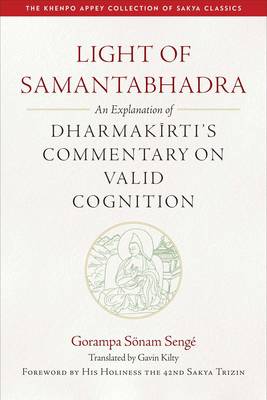
Bedankt voor het vertrouwen het afgelopen jaar! Om jou te bedanken bieden we GRATIS verzending (in België) aan op alles gedurende de hele maand januari.
- Afhalen na 1 uur in een winkel met voorraad
- In januari gratis thuislevering in België
- Ruim aanbod met 7 miljoen producten
Bedankt voor het vertrouwen het afgelopen jaar! Om jou te bedanken bieden we GRATIS verzending (in België) aan op alles gedurende de hele maand januari.
- Afhalen na 1 uur in een winkel met voorraad
- In januari gratis thuislevering in België
- Ruim aanbod met 7 miljoen producten
Zoeken
Light of Samantabhadra
An Explanation of Dharmakirti's Commentary on Valid Cognition
€ 84,45
+ 168 punten
Omschrijving
An illuminating gateway to Indian philosophy and its explication in Tibet. Among the many works produced in the rich philosophical tradition of India's classical age, few have had more impact than Dharmakirti's Commentary on Valid Cognition (Pramanavarttika). Composed in India in the seventh century, it became the cornerstone for the study of logic and epistemology in the Tibetan Buddhist tradition. An important addition to any collection for the Sakya practitioner, Light of Samantabhadra translates the work of one of the premier scholars of the Sakya school, Gorampa Sonam Sengé (1429-89). Gorampa here illuminates the first two chapters of Dharmakirti's treatise, those on using inference to enlighten oneself (svarthanumana) and on establishing valid cognition (pramanasiddhi), both to determine the authority of the Buddha as a valid teacher and to eliminate the cognitive obstacles to awakening. The root text is composed in compact verses, and these are translated here along with Gorampa's word-by-word commentary that reveals their often-veiled meanings. These chapters explore key issues in the philosophy of language and the nature of conventional designation, the way to employ sound reasoning, the proof of past and future lives, and the way to eliminate the view of self. In the skilled hands of translator Gavin Kilty, these insights are made accessible to contemporary readers.
Specificaties
Betrokkenen
- Vertaler(s):
- Uitgeverij:
Inhoud
- Aantal bladzijden:
- 536
- Taal:
- Engels
- Reeks:
Eigenschappen
- Productcode (EAN):
- 9781614297512
- Verschijningsdatum:
- 18/07/2023
- Uitvoering:
- Hardcover
- Formaat:
- Genaaid
- Afmetingen:
- 162 mm x 234 mm
- Gewicht:
- 852 g

Alleen bij Standaard Boekhandel
+ 168 punten op je klantenkaart van Standaard Boekhandel
Beoordelingen
We publiceren alleen reviews die voldoen aan de voorwaarden voor reviews. Bekijk onze voorwaarden voor reviews.








